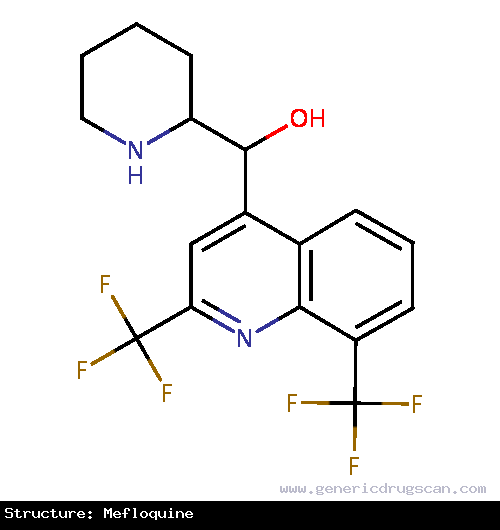Mefloquine Drug: Indication, Dosage, Precaution, Side Effect , Storage, Category Type and corresponding Brands - www.genericdrugscan.com
Mefloquine
Drug Status in USA : ApprovedDrug Status in Canada : Approved
pronunciation
pronounced as (mef' loe kwin)
Why is this medication prescribed?
Mefloquine is used to treat malaria (a serious infection that is spread by mosquitoes in certain parts of the world and can cause death) and to prevent malaria in travelers who visit areas where malaria is common. Mefloquine is in a class of medications called antimalarials. It works by killing the organisms that cause malaria.
How should this medicine be used?
Mefloquine comes as a tablet to take by mouth. Always take mefloquine with food (preferably your main meal) and at least 8 ounces (240 milliliters) of water. If you are taking mefloquine to prevent malaria, you will probably take it once a week (on the same day each week). You will begin treatment 1 to 3 weeks before you travel to an area where malaria is common and should continue treatment for 4 weeks after you return from the area. If you are taking mefloquine to treat malaria, your doctor will tell you exactly how often you should take it. Children may take smaller but more frequent doses of mefloquine. Follow the directions on your prescription label carefully, and ask your doctor or pharmacist to explain any part you do not understand. Take mefloquine exactly as directed. Do not take more or less of it or take it more often than prescribed by your doctor.
The tablets may be swallowed whole or crushed and mixed with water, milk, or other beverage.
If you are taking mefloquine to treat malaria, you may vomit soon after you take the medication. If you vomit less than 30 minutes after you take mefloquine, you should take another full dose of mefloquine. If you vomit 30 to 60 minutes after you take mefloquine, you should take another half dose of mefloquine. If you vomit again after taking the extra dose, call your doctor.
What are the precautions to be followed?
Before taking mefloquine,- tell your doctor and pharmacist if you are allergic to mefloquine, quinidine (Quinadex), quinine (Qualaquin), any other medications, or any of the ingredients in mefloquine tablets.
- tell your doctor and pharmacist what prescription and nonprescription medications, vitamins, nutritional supplements, and herbal products you are taking. Be sure to mention any of the following: anticoagulants ('blood thinners'); antidepressants such as amitriptyline (Elavil), amoxapine (Asendin), clomipramine (Anafranil), desipramine (Norpramin), doxepin (Adapin, Sinequan), imipramine (Tofranil), nortriptyline (Aventyl, Pamelor), protriptyline (Vivactil), and trimipramine (Surmontil); antihistamines; calcium channel blockers such as amlodipine (Norvasc), diltiazem (Cardizem, Dilacor, Tiazac), felodipine (Plendil), isradipine (DynaCirc), nicardipine (Cardene), nifedipine (Adalat, Procardia), nimodipine (Nimotop), nisoldipine (Sular), and verapamil (Calan, Isoptin, Verelan); beta blockers such as atenolol (Tenormin), labetalol (Normodyne), metoprolol (Lopressor, Toprol XL), nadolol (Corgard), and propranolol (Inderal); chloroquine (Aralen); medication for diabetes, mental illness, seizures and upset stomach; medications for seizures such as carbamazepine (Tegretol), phenobarbital (Luminal), phenytoin (Dilantin), or valproic acid (Depakene); and rifampin (Rifadin, Rimactane, in Rifamate, in Rifater). Also tell your doctor or pharmacist if you are taking the following medications or have stopped taking them within the past 15 weeks: halofantrine (Halfan; no longer available in the United States) or ketoconazole (Nizoral). Your doctor may need to change the doses of your medications or monitor you carefully for side effects.
- tell your doctor if you have or have ever had any of the conditions mentioned in the IMPORTANT WARNING section or any of the following: a prolonged QT interval (a rare heart problem that may cause irregular heartbeat, fainting, or sudden death), anemia (a lower than normal number of red blood cells), or eye, liver or heart disease.
- tell your doctor if you are pregnant or plan to become pregnant, or are breast-feeding. You should use birth control while you are taking mefloquine and for 3 months after you stop taking it. If you become pregnant while taking mefloquine, call your doctor.
- you should know that mefloquine may make you drowsy and dizzy. These symptoms may continue for a while after you stop taking mefloquine. Do not drive a car or operate machinery until you know how this medication affects you.
- you should know that mefloquine decreases your risk of becoming infected with malaria but does not guarantee that you will not become infected. You still need to protect yourself from mosquito bites by wearing long sleeves and long pants and using mosquito repellant and a bed net while you are in an area where malaria is common.
- you should know that the first symptoms of malaria are fever, chills, muscle pain, and headaches. If you are taking mefloquine to prevent malaria, call your doctor immediately if you develop any of these symptoms. Be sure to tell your doctor that you may have been exposed to malaria.
- you should plan what to do in case you experience serious side effects from mefloquine and have to stop taking the medication, especially if you are not near a doctor or pharmacy. You will have to get another medication to protect you from malaria. If no other medication is available, you will have to leave the area where malaria is common, and then get another medication to protect you from malaria.
- if you are taking mefloquine to treat malaria, your symptoms should improve within 48 to 72 hours after you finish your treatment. Call your doctor if your symptoms do not improve after this time.
- do not have any vaccinations (shots) without talking to your doctor. Your doctor may want you to finish all of your vaccinations 3 days before you start taking mefloquine.
What are possible side effects of this medication ?
Mefloquine may cause side effects. Tell your doctor if any of these symptoms are severe or do not go away:- nausea
- vomiting
- fever
- diarrhea
- pain on the right side of your stomach
- loss of appetite
- muscle pain
- headache
- sleepiness
- increased sweating
- tingling in your fingers or toes
- difficulty walking
- light-colored bowel movements
- dark colored urine
- yellowing of your skin or the white of your eyes
- itching
- shaking of arms or legs that you cannot control
- changes in vision
- muscle weakness
- shortness of breath
- chest pain
- panic attack
- rash
Mefloquine may cause other side effects. You may continue to experience side effects for some time after you take your last dose. Call your doctor if you have any unusual problems while taking this medication.
How to store the medication and dispose it of after its use later?
Keep this medication in the container it came in, tightly closed, and out of reach of children. Store it at room temperature and away from excess heat and moisture (not in the bathroom).
Unneeded medications should be disposed of in special ways to ensure that pets, children, and other people cannot consume them. However, you should not flush this medication down the toilet. Instead, the best way to dispose of your medication is through a medicine take-back program.
Drug Category/Class
- Antimalarials
- Methanolquinolines
- Antiparasitic Products, Insecticides and Repellents
- Combined Inhibitors of CYP3A4 and P-glycoprotein
- Antiprotozoal Agents
- CYP2D6 Inducers
- CYP2D6 Inducers (strong)
- CYP3A4 Inhibitors
- Methanolquinolines
- Artemisinin and derivatives, combinations
| Prescribed | For the treatment of mild to moderate acute malaria caused by Mefloquineuine-susceptible strains of Plasmodium falciparum (both chloroquine-... |
| Weight : | 378.3122 |
| Structure | Mefloquine |
 | |
| Formula | C17H16F6N2O |
Mefloquine has 21 Brands listed
Search Generic Drugs alphabetically
